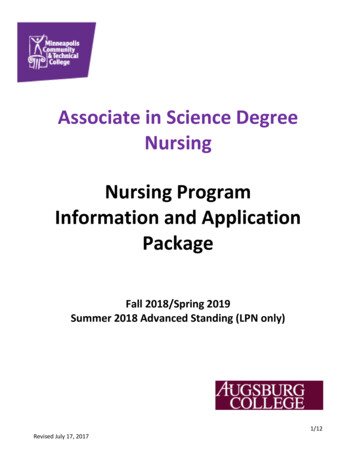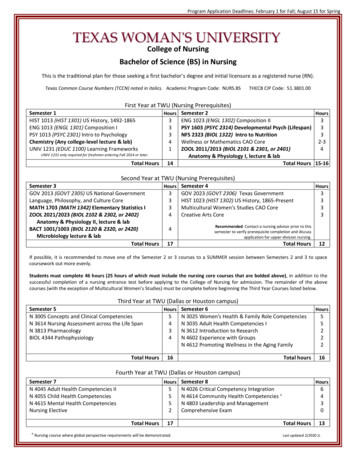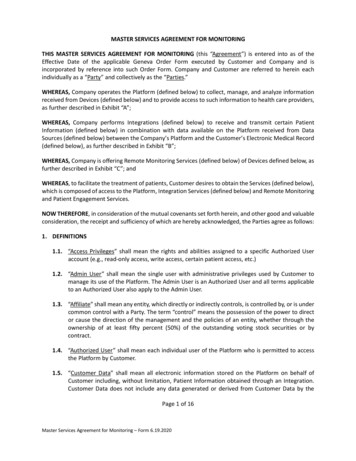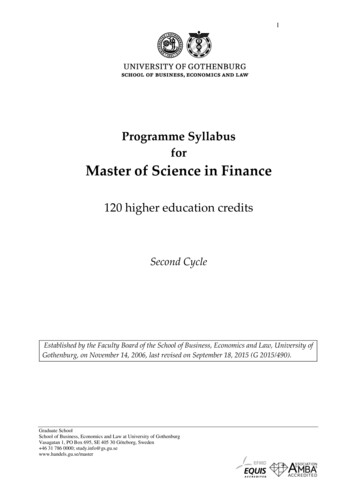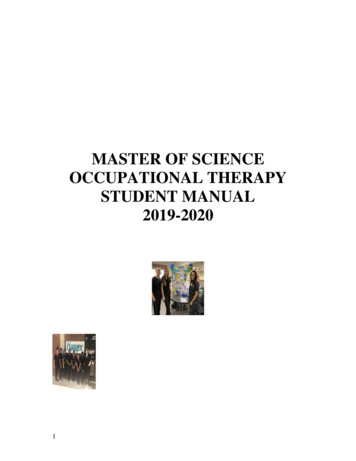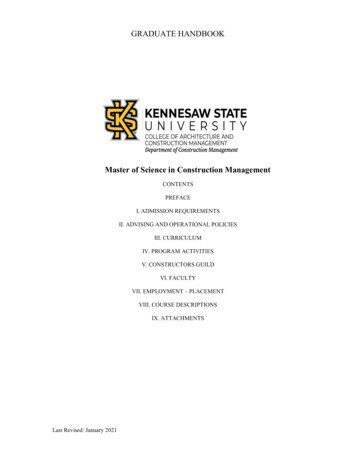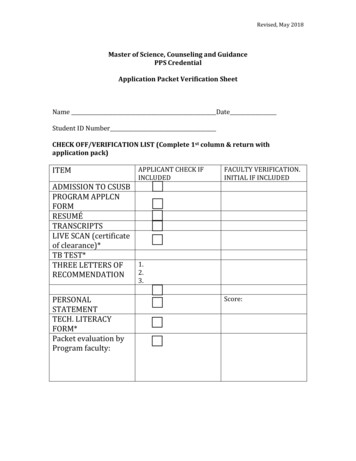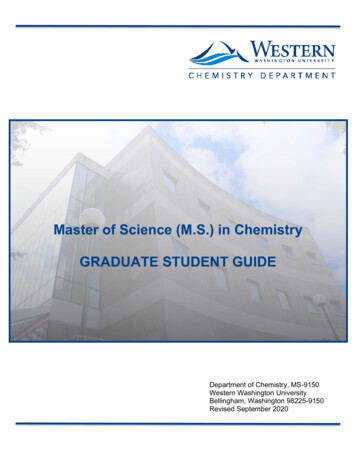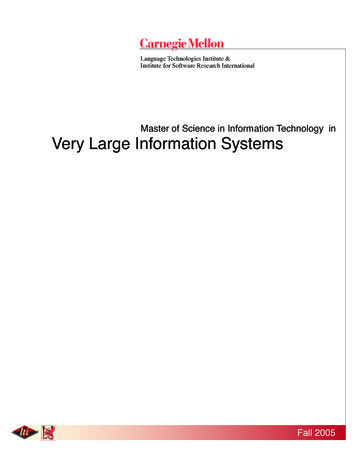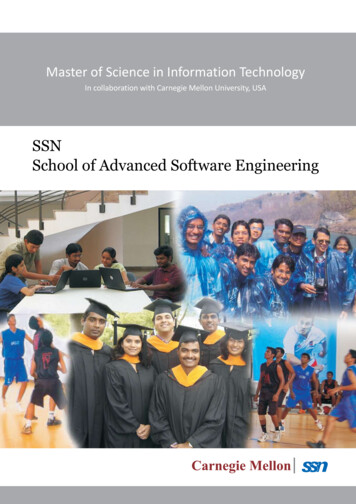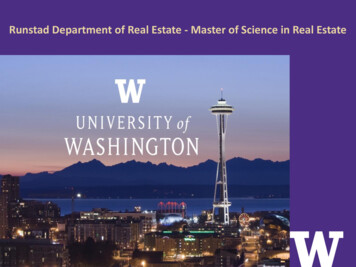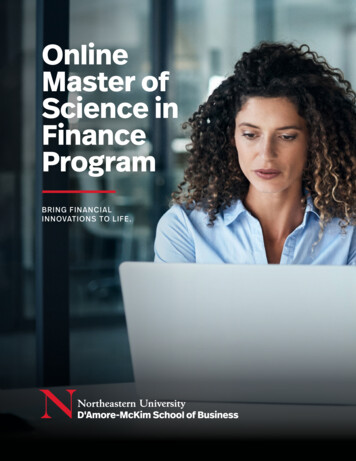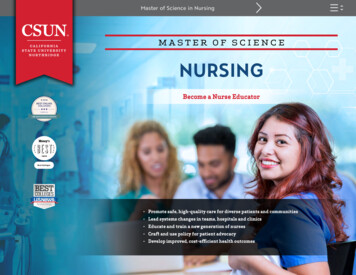
Transcription
Master of Science in Nursingmaster of scienceNURSINGBecome a Nurse Educator Promote safe, high-quality care for diverse patients and communities Lead systems changes in teams, hospitals and clinics Educate and train a new generation of nurses Craft and use policy for patient advocacy Develop improved, cost-efficient health outcomes
Master of Science in NursingTable of ContentsMaster of Science in NursingAlumniFeatures to Help You Advance in Your CareerCSUN: A Leader in OnlineGraduate EducationAccreditationCurriculumCourse DescriptionsDistinguished FacultySupporting the Educational Successof Midcareer ProfessionalsAdmission to the ProgramContact Us
Master of Science in NursingBecome a Nurse EducatorThis master’s program prepares you for advanced practice as a nurse educator. In only fifteenmonths, you’ll develop the sophisticated skills and knowledge to transform health careenvironments and excel in senior nursing positions.In addition to fully online classes, the program features clinical training at a location near you.Alongside other nursing professionals, you’ll learn how to:43% of pre-licensure nursingprograms state the numberone reason for the inability toexpand enrollment into theirnursing program is a lack ofnursing faculty.National League for Nursing Promote safe, high-quality care for diverse patients and communities Lead systems changes in teams, hospitals and clinics Educate and train a new generation of nurses Craft and use policy for patient advocacy Develop improved, cost-efficient health outcomesCourse work includes lectures, classroom activities, online modules, simulations andclinical practice.
Master of Science in NursingEarn your national certification.When you finish the program, you’ll qualify to sit for the National League of Nursing EducationCertification Exam, which certifies you as a Nurse Educator (CNE). This designation is attractive toemployers nationwide – and, combined with your master’s, will help you stand apart in today’s highlycompetitive market.Prepare for practice at the highest level.With our partners in industry, we designed a curriculum based on theory, practice and real-worldrelevance, giving you the professional skill set to address and manage health care’s most urgent needs.Along with advanced study of emerging trends, courses focus on nursing theory, curriculum design,organizational leadership, evidence-based practice, and health care policy.Nurse Educators can be foundin nearly every healthcaresetting such as hospitals,psychiatric and rehabilitationfacilities, public health centers,and hospice care along within colleges, universities andin businesses.NurseJournalGain valuable clinical experience.Outside your classes, you’ll engage in important clinical fieldwork. Offered in a variety of healthcare settings, at a location near you, this hands-on practice is critical to your development as a nurseeducator and serves as a necessary compliment to academic study.Attend class completely online.As you hone your clinical abilities, we’ll help you master essential concepts in class – all on ourconvenient online platform. Our online courses feature live class sessions, on-demand access tolearning materials, and daily networking opportunities.From day one, you’ll study a curriculum designed by industry experts,available to you anytime and anywhere.
Master of Science in NursingFeatures to Help You Advancein Your Career.Understanding that working professionals have special needs, we’re committed to providing you withthe highest level of technology, support and care. What you can expect:Work-friendly scheduling – This hybrid program will give you significant flexibility to completecourse work at times and in places that work best for you.A community of peers – When you start the program, you’ll join a learning community of students andfaculty. With this group of professionals and industry experts, you’ll move toward graduation, buildinga network along the way and setting the stage for advancement in your field.By 2030, the world needs 18million more healthcare workersto meet the requirements ofuniversal health coverage,out of which 9 million ofhealthcare workers would benurses and midwives.Ongoing, personal support – As you take your classes, you’ll receive the support of a personal programteam. These specialists, in addition to being good listeners, can help you with all administrativematters, freeing you to focus on your course work and your career.American Association ofColleges of Nursing Interactive courses that engage you in active learningTechnical assistance – Our distance-learning team provides technical training and support beforeyour program even begins. Available on evenings and weekends, this team can help you troubleshootissues, access content, interact with classmates and faculty, plus much more.In addition to premium, one-on-one support, you’ll also have: 24/7 library resources Remarkable flexibility of time and location Ease of communication with program faculty and colleaguesConnect to Our Global Alumni Network.CSUN has more than 360,000 alumni that provide new graduates with a network of connections inCalifornia, across the nation and around the globe. Graduates are found in leading roles in many fields,including business, the arts, entertainment, science, engineering, civic life and education.
Master of Science in NursingCSUN: A Leader in Online GraduateEducationCSUN is a model institution for cultural diversity and rigorous scholarship in Greater Los Angeles andbeyond. Here, students combine academic pursuits with hands-on experience to assemble the robustskills needed to thrive in today’s global economy.Each year, CSUN’s online programs receive national recognition for their innovative curriculum,instruction and methods. All online curriculum is designed by the same distinguished faculty andleading practitioners as on-campus programs. This approach ensures that each course, whether oncampus or online, is held to the same high standards of academic excellence and student achievement.Jobs for postsecondaryeducators willexperience 9% growthbetween 2019-2029 farabove the average.Bureau of Labor StatisticsCSUN’s award-winning online programs are developed through a strong collaboration betweenfaculty, instructional design teams and technical professionals. This partnership creates an engagedonline learning community and adds enormous flexibility to the demanding personal and professionallives of participants.Faculty receive individualized training and ongoing support to ensure smooth and effective use ofonline educational technology. CSUN’s professional distance-learning staff also provides training andstart-to-finish technical support to students in online degree programs.Education-technology specialists, assigned to each online program and cohort, develop strongworking relationships with those enrolled. This real-world support comes from actual people on theCSUN campus, and not just at a “virtual help desk,” who remain fully committed to student successfrom day one until graduation.Distinction in AccreditationCalifornia State University, Northridge is accredited by The Western Association of Schools andColleges (WASC), a regional institutional accrediting body, recognized by the U.S. Council of HigherEducation and Accreditation. In 2012, the WASC Commission stated, “The Commission commendsCSUN for becoming a model learning organization characterized by collaborative and evidence-basedplanning, decision making and problem solving. Among its accomplishments during this review are itsdeep understanding of the characteristics and needs of CSUN students, which has led to programs andactivities that promote student success. As noted by the team, the foundation at CSUN could not bestronger.” Visit the University Accreditation web page for more information.
Master of Science in NursingProfessionally Focused CurriculumThis master’s program features a curriculum designed to meet the career development needsof midcareer professionals. The following courses have been created and sequenced to form anintegrated program of study. Later courses build on earlier ones to provide a powerful, cumulativelearning experience.COURSE LIST (37 units)Core Courses (11 Units)NURS 500 Evolving Roles of the Advanced Practice Nurse (3 units)NURS 501 Ethics, Policy, and Legal Implications for Advanced Practice Nursing (3 units)NURS 502 Information Management for Advanced Nursing Practice (2 units)"70% of full-time nursingfaculty are over the age of 45and approaching retirementand need to be replaced."NURS 503 Science Development, Study Design, and Statistics (3 units)NURS 510 Pathophysiological Foundation for the Advanced Practice Nurse (3 units)Beverly Malone, CEO of the NationalLeague for NursingNURS 511 Assessment and Diagnostic Reasoning (3 units)Advanced Practice Courses (10 Units)NURS 511L Assessment and Diagnostic Reasoning Lab (1 unit)NURS 512 Pharmacological Foundation for the Advanced Practice Nursing (3 units)Specialty Nursing Education Courses (15 Units)NURS 560 Theories of Teaching and Instruction in Nursing (3 units)NURS 561 Curriculum Development in Nursing (3 units)NURS 562 Evaluation and Assessment in Nursing Education (3 units)NURS 563 Nurse Educator Role Development (3 units)NURS 664 Strategies in Nursing Education-Practicum (3 units)Culminating Experience (1 Unit)NURS 697 Directed Comprehensive Studies / Exam (1 unit)
Master of Science in NursingCourse DescriptionsCORE COURSESNURS 500 Evolving Roles of the AdvancedPractice Nurse (3 units)This course explores the roles of advanced practice nurses in professional and organizationalcontexts. In the course, students will learn howto apply nursing theory and cultural competencyto team-based environments. They’ll also learneffective collaboration and communicationskills, tailored to health care settings. With that,students will analyze key issues and challengesaffecting outcomes and learn how to be an effective organizational and systems leader.NURS 501 Ethics, Policy, and LegalImplications for Advanced Practice Nursing(3 units)In this course, students will examine the social,political, ethical, and economic structures ofnursing practice. Alongside this, they’ll studythe factors shaping access to safe, high-qualitycare in both domestic and global systems. Thecourse also analyzes activism and advocacy inU.S. health care. Ethical reasoning is emphasizedas the foundation for practice, policy, and economics, as well as for corollary laws, regulations,resource allocation, funding strategies, costs,budgeting, and outcomes.NURS 502 Information Management forAdvanced Nursing Practice (2 units)This course provides advanced practice nursingstudents with an overview of the managementof information and data through applicationof computer, information, and nursing practice concepts. The focus is on how informationtechnology is employed within clinical practice,administration, education, and research settings to disseminate healthcare knowledge andpromote interprofessional communication tooptimize care delivery and outcomes. The courseenhances knowledge and understanding of theethical and legal considerations associated withapplication of informatics in the healthcare andeducation settings. Selected software programs/applications are presented and used.NURS 503 Science Development, Study Design,and Statistics (3 units)The focus of this course is scholarly inquiry andtranslation of evidence into protocols and practice within the context of ethics, advocacy, andpatient safety. Scholarly inquiry for this courseincludes systemic critical analysis, evaluation,synthesis, application, and integration of theoretical and empirical principles of research togenerate evidence-based recommendations fornursing practice.SCIENCE CORE COURSESNURS 510 Pathophysiological Foundation forthe Advanced Practice Nurse (3 units)The content of this course covers concepts inhuman physiology and pathophysiology thatserve as foundation for advanced practice nursesin their clinical assessment, clinical diagnosticdecision-making, and health care management.Alterations of various physiological systemsand pathophysiology of frequently encounteredhealth conditions across the life span, includingspecial populations, are reviewed. Evidencebased concepts relevant to normal physiology,etiology, including those relevant to genetics andenvironment, and clinical manifestations andresponses to common diseases/altered healthstates are compared across life span. Clinicalscreening and diagnostic evaluative methods arealso discussed.NURS 511 Assessment and DiagnosticReasoning (3 units)This course provides the student with knowledge of advanced health assessment of clientswithin the context of the advanced practice role.This course builds on the knowledge of anatomy,physiology, pathology, and health assessmentskills attained in previous courses. Emphasisis on acquisition and analysis of relevant datafor the development of a comprehensive andholistic assessment and interpretation of screening and diagnostic tests to formulate a differential diagnosis.
Master of Science in NursingNURS 511L Assessment and DiagnosticReasoning Lab (1 unit)The emphasis of this laboratory course is on theknowledge and application of advanced skillsrequired to perform a comprehensive healthassessment. Practice of health assessmenttechniques, guidelines, and consideration forpatients across the life span are presented. Thereis a focus on normal findings within each bodysystem and deviations relevant to age, gender,ethnicity, and diseases.NURS 512 Pharmacological Foundation for theAdvanced Practice Nursing (3 units)This course provides the knowledge and skills forclinical application of advanced pharmacologyand pharmacotherapeutics as it relates to common health conditions of the adolescent, adultand geriatric patient. Emphasis is on the development of therapeutic decision making in drugselection for the client based on health problems,individual variations, cultural and economic considerations. Focus is on the prescriptive practice,client education and monitoring of the therapeutic response to pharmacological agents in diverseclients across the lifespan.NURSING EDUCATION COURSESNURS 560 Theories of Teaching andInstruction in Nursing (3 units)This course focuses on examining prominenttheories of teaching and models of instructionthat are applicable to the classroom, nursing skilllaboratory, and clinical education. Theoreticalapproaches classified as behaviorist, social interactionism, and cognitive as well as adult learningtheories are discussed and analyzed. Evidencebased research relative to nursing education isreviewed and critiqued.NURS 561 Curriculum Development in Nursing(3 units)Curriculum principles and strategies that incorporate accrediting nursing bodies curricularessentials are presented. Curricula of the associate, baccalaureate and graduate nursing degreesare addressed and differentiated with referenceto accrediting bodies' curricular essentialsand certifying state regulators requirements.Emphasis is placed on integrating the interplay of curricular systematic decision-making,curriculum planning and development, systematic assessment of outcomes, and accreditationrequirements/self-study.NURS 562 Evaluation and Assessment inNursing Education (3 units)This course explores various theories on assessments and evaluation and examines importanttheoretical, ethical and practical issues in assessment, evaluations, measurement and testing innursing education.NURS 563 Nurse Educator Role Development(3 units)This course focuses on examining models of thenurse educator role and analyzing strategies foreffective teaching, practice, scholarship, andservice. Leadership is examined through the lensof a system framework for effective change andtransformation.NURS 664 Strategies in Nursing Education(3 units / practicum)This course focuses on providing mentoredtraining on integrating evidence-based, learning-centered teaching and learning strategies.This practicum course is completed with a nurseeducator preceptor in a selected setting (class-room, skills and simulation laboratory, clinicalpractice). The course affords students the opportunity to refine educational expertise in theirselected areas of interest (e.g. assessment oflearning needs, program/curriculum planning,implementation, and assessment/evaluation ineither a traditional or nontraditional setting).This practicum offers the opportunities for students to begin integrating the role of the nurseeducator into their professional behaviors.NURS 697 Directed ComprehensiveStudies/Exam (1 unit)The comprehensive final examination forstudents in the Master of Nursing program isdesigned to test the student’s ability to integrateand apply knowledge from the core areas of nursing to a specialty area. The master’s examinationserves as a culminating activity, which providesa student with the opportunity to synthesizeknowledge and experience gained through his/her master’s program. This examination forcesthe student to rise above individual courses toreach a comprehensive understanding of theoryand principles of the nursing discipline and his/her area of specialty; and to use the knowledgegained in individual courses as the foundationfrom which such comprehensive understandingis reached. The schedule of this one-unit courseis composed of 5 class sessions of 3 hours each toassist and guide students’ integrative learningand synthesis. Comprehensive examination mustbe taken after students have completed all unitsof study and successfully completed it before theaward of a degree.
Master of Science in NursingDistinguished FacultyThis master’s program is designed and taught by CSUN faculty members in collaboration withindustry experts who are leaders in their areas of specialization. This blend of practitionerswith outstanding CSUN faculty ensures that you will graduate with a solid academic backgroundand be well prepared for the realities of practice in the field. Faculty bios can be read on theFaculty web page.Los Angeles-Long BeachAnaheim is one of the top 5metro areas with the highestnumber of nurse educators.All Nursing SchoolsTalin Bakalian, Ph.D. candidateMarianne Hattar-Pollara, Ph.D., RN, FAANLecturer, Department of NursingProfessor, Department of NursingRebekah Child, Ph.D.Martha Highfield, Ph.D.Chair and Associate Professor, Department of NursingProfessor Emeritus, Department of NursingJon Christensen, Ph.D., RNSamira Moughrabi, Ph.D.Assistant Professor, Department of NursingAssociate Professor, Department of NursingRosine Der-Tavitian, DNPZarmine Naccashian, Ph.D.Lecturer, Department of NursingAssociate Professor, Department of NursingLaura Gelardi, DNPDebra Wallace, DNPAssistant Professor, Department of NursingClinical Instructor, Department of Nursing
Master of Science in NursingThe Advantages of CSUN’s Approach toSupporting the Educational Success ofWorking ProfessionalsStarting a degree program is a big step, but – for working adults – the real value is in completing theprogram. That is why CSUN focuses on providing the outstanding student support services that ensureparticipants meet their educational goals and succeed in graduating. We recognize that midcareerprofessionals undertaking advanced professional education need to focus on their academic workto be successful in the program. This recognition prompted the development of a level of supportservices rare among public universities.CSUN graduate programs areproud to have achieved highgraduation rates with somecohorts reaching up to 90%.Students should not have to spend time trying to figure out and navigate the university’sadministrative systems. With that in mind, the program coordinator assigned to each cohort workswith students from the point of application through graduation. This practice ensures that eachstudent will have direct persona
43% of pre-licensure nursing programs state the number one reason for the inability to expand enrollment into their nursing program is a lack of nursing faculty. . CSUN’s award-winning online programs are developed through a strong collaboration between faculty, in
